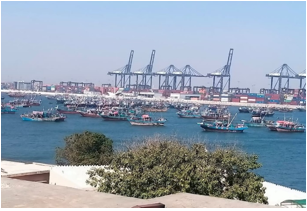i INP-WEALTHPK
Ayesha Saba
Strategic investments in automation, sustainability, and digital infrastructure can help revive Pakistan’s maritime sector, enabling it to unlock billions in trade revenue and job creation, experts stress.

As global maritime trade evolves, Pakistan must act swiftly — or risk falling further behind in the race for economic growth, they warn. Speaking to WealthPK, Kamran Ahmed, Research Associate at the National Institute of Maritime Affairs (NIMA), said that Pakistan’s failure to upgrade its ports, logistics, and shipbuilding capacities over the past two decades has caused severe structural inefficiencies.
“We are still operating under a framework that hasn’t evolved with global shipping standards,” he remarked. “The world has moved toward automation, digitalised customs procedures, and green port technologies. Meanwhile, we’re still dependent on outdated handling systems, paper-based processes, and undertrained staff,” he noted. “Pakistan’s ports, including Karachi Port and Port Qasim, lag behind global competitors due to manual processes and inefficiencies.
The world is moving toward smart ports with automated cargo handling, blockchain-based logistics, and real-time tracking systems,” he explained. “Pakistan must invest in these technologies to reduce turnaround times and attract international shipping lines,” he emphasised. Ahmed said that currently, vessels often face delays due to bureaucratic hurdles and slow operations, discouraging major players from using Pakistani ports as transshipment hubs.
He pointed out that local fishermen still use traditional methods, leading to overfishing and poor catch quality. “GPS-enabled tracking, modern cold storage, and automated processing units could revolutionise this sector,” he suggested. Without such advancements, Pakistan’s seafood exports — a potential multi-billion-dollar industry — remain underdeveloped, losing out to countries like Vietnam and Thailand that have modernised their fleets and supply chains, he noted.
Mehmood Khalid, former project director, Centre of Excellence-CPEC and head of the fiscal policy section at Pakistan Institute of Development Economics, highlights that stricter International Maritime Organisation regulations on carbon emissions require Pakistan to adopt cleaner energy solutions. “LNG-powered vessels, shore-to-ship electrification, and solar-powered port operations are no longer optional — they’re a necessity,” he said.
“Investing in sustainable practices would not only reduce pollution but also enhance Pakistan’s reputation in international trade circles. Currently, the country’s shipping industry relies heavily on outdated, fuel-guzzling vessels, making it less competitive in an eco-conscious market,” he continued. Despite these challenges, Khalid saw hope in Gwadar Port, which could become a game-changer if equipped with cutting-edge technology.
“However, progress has been slow due to funding gaps and policy delays.” “The government must collaborate with private investors and international tech firms to bring in automation and smart logistics,” he suggested. “Public-private partnerships could fast-track digitisation, while training programmes for port workers would ensure a smooth transition to new systems.”
Credit: INP-WealthPk



